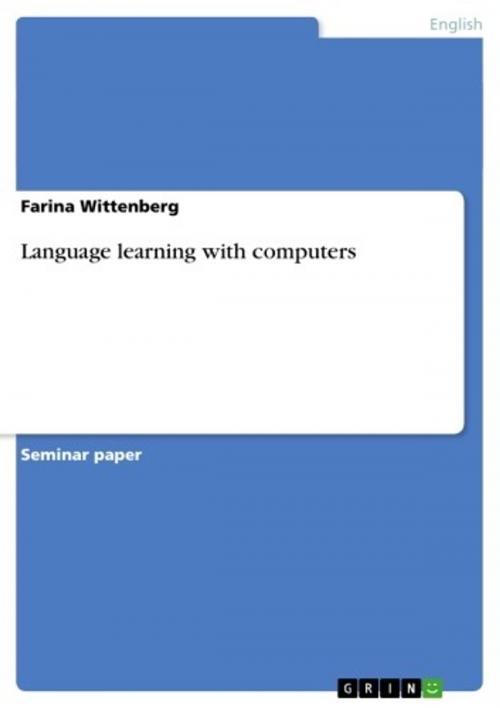| Author: | Farina Wittenberg | ISBN: | 9783638304559 |
| Publisher: | GRIN Publishing | Publication: | September 3, 2004 |
| Imprint: | GRIN Publishing | Language: | English |
| Author: | Farina Wittenberg |
| ISBN: | 9783638304559 |
| Publisher: | GRIN Publishing |
| Publication: | September 3, 2004 |
| Imprint: | GRIN Publishing |
| Language: | English |
Seminar paper from the year 2004 in the subject English Language and Literature Studies - Linguistics, grade: 1,0 (A), University of Duisburg-Essen, course: Language learning on- and offline, language: English, abstract: This paper is based on an oral report about `computers in school´. Since my group and I did a lot of research in schools including interviews and a visit in a language lesson I will use our results for developing this work. The question I asked myself before I started researching is whether computers are a good alternative to frontal teaching in language lessons. I will compare both teaching methods after I write about research results about the two options. In the end an evaluation of the results will be made. First of all I have to say that Pro and Contra arguments of course slightly vary from person to person since everyone has different points of view. I start with listing up the Contra points. The first point is the financial aspect of computers1. To afford the whole equipment for a whole school costs quite a lot and is much more of an investment than maybe some books. If the school does not have enough money it could be unaffordable to pay for the right amount of computers, screens, etc. Another important aspect is that some teachers did not, like most of the recent pupils, grow up with computers and still do not know how to handle it. Some of them think they are too old for trying to get into this new type of media. And even if they would try it they think they are technically not as good as the pupils themselves and could look like a fool in front of the class2. [...] 1 See Christiane Kallenbach, Markus Ritter: Computerideen für den Englischunterricht. Anregungen und Beispiele für den Software- und Interneteinsatz Klassen 5-10. Berlin 2000, p. 11 2 See Kallenbach, Ritter, [See note 1], page 11
Seminar paper from the year 2004 in the subject English Language and Literature Studies - Linguistics, grade: 1,0 (A), University of Duisburg-Essen, course: Language learning on- and offline, language: English, abstract: This paper is based on an oral report about `computers in school´. Since my group and I did a lot of research in schools including interviews and a visit in a language lesson I will use our results for developing this work. The question I asked myself before I started researching is whether computers are a good alternative to frontal teaching in language lessons. I will compare both teaching methods after I write about research results about the two options. In the end an evaluation of the results will be made. First of all I have to say that Pro and Contra arguments of course slightly vary from person to person since everyone has different points of view. I start with listing up the Contra points. The first point is the financial aspect of computers1. To afford the whole equipment for a whole school costs quite a lot and is much more of an investment than maybe some books. If the school does not have enough money it could be unaffordable to pay for the right amount of computers, screens, etc. Another important aspect is that some teachers did not, like most of the recent pupils, grow up with computers and still do not know how to handle it. Some of them think they are too old for trying to get into this new type of media. And even if they would try it they think they are technically not as good as the pupils themselves and could look like a fool in front of the class2. [...] 1 See Christiane Kallenbach, Markus Ritter: Computerideen für den Englischunterricht. Anregungen und Beispiele für den Software- und Interneteinsatz Klassen 5-10. Berlin 2000, p. 11 2 See Kallenbach, Ritter, [See note 1], page 11















